Analyzing Fussell's Arguments on the Atomic Bombing of Japan
VerifiedAdded on 2023/06/11
|5
|1567
|250
Essay
AI Summary
This essay examines the justifications for the United States' use of atomic bombs on Hiroshima and Nagasaki in 1945, focusing on arguments presented by Paul Fussell. Fussell, a World War II veteran, argues that the bombings were tragic necessities to prevent further loss of American and British lives during a potential invasion, citing the Japanese military's refusal to surrender and their brutal treatment of prisoners. The essay discusses various perspectives, including those who believed the bombings were the only way to end the war and those who condemned them as inhumane. It highlights the debate surrounding the necessity and morality of the bombings, ultimately concluding that the US actions were justifiable in the context of ending the war and saving lives, despite the horrific consequences.
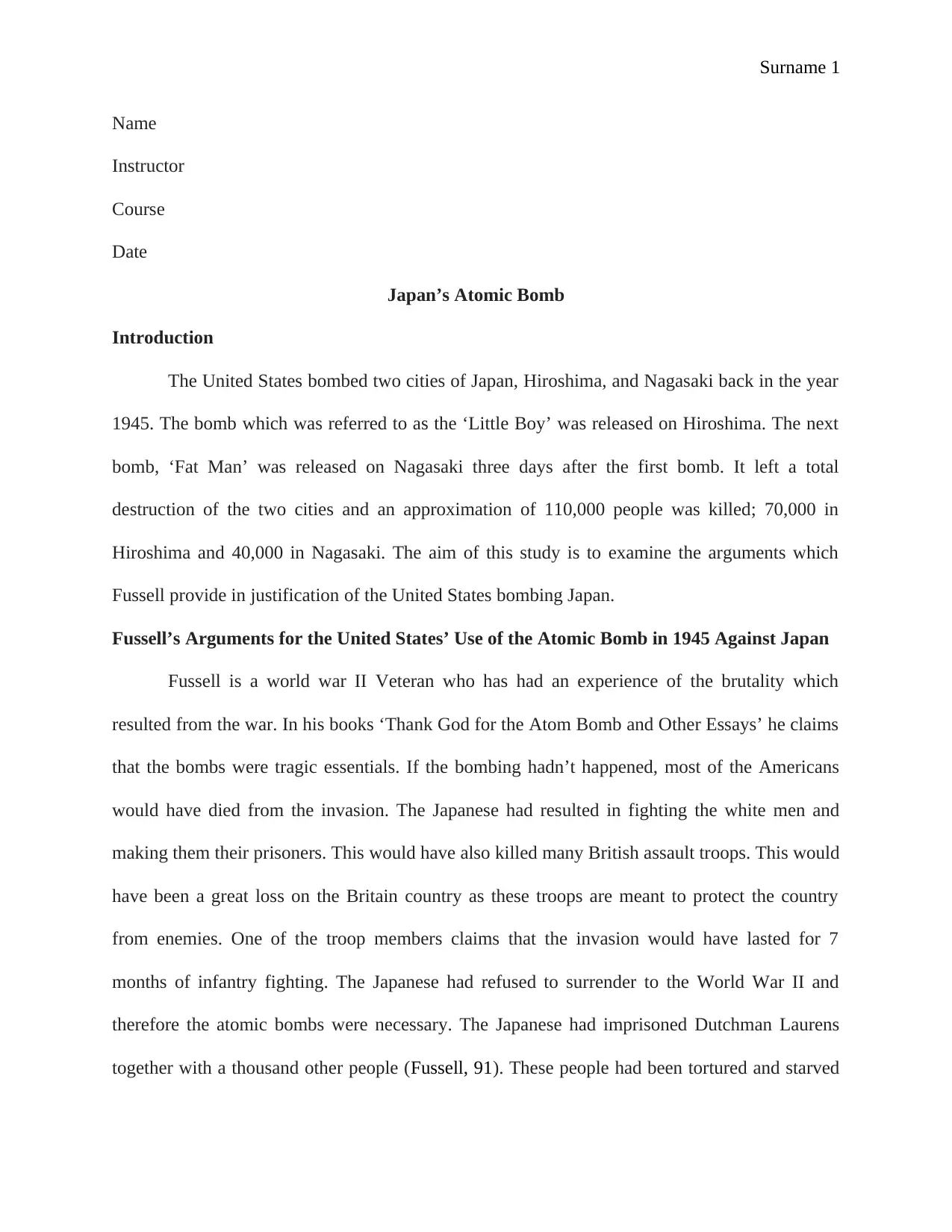
Surname 1
Name
Instructor
Course
Date
Japan’s Atomic Bomb
Introduction
The United States bombed two cities of Japan, Hiroshima, and Nagasaki back in the year
1945. The bomb which was referred to as the ‘Little Boy’ was released on Hiroshima. The next
bomb, ‘Fat Man’ was released on Nagasaki three days after the first bomb. It left a total
destruction of the two cities and an approximation of 110,000 people was killed; 70,000 in
Hiroshima and 40,000 in Nagasaki. The aim of this study is to examine the arguments which
Fussell provide in justification of the United States bombing Japan.
Fussell’s Arguments for the United States’ Use of the Atomic Bomb in 1945 Against Japan
Fussell is a world war II Veteran who has had an experience of the brutality which
resulted from the war. In his books ‘Thank God for the Atom Bomb and Other Essays’ he claims
that the bombs were tragic essentials. If the bombing hadn’t happened, most of the Americans
would have died from the invasion. The Japanese had resulted in fighting the white men and
making them their prisoners. This would have also killed many British assault troops. This would
have been a great loss on the Britain country as these troops are meant to protect the country
from enemies. One of the troop members claims that the invasion would have lasted for 7
months of infantry fighting. The Japanese had refused to surrender to the World War II and
therefore the atomic bombs were necessary. The Japanese had imprisoned Dutchman Laurens
together with a thousand other people (Fussell, 91). These people had been tortured and starved
Name
Instructor
Course
Date
Japan’s Atomic Bomb
Introduction
The United States bombed two cities of Japan, Hiroshima, and Nagasaki back in the year
1945. The bomb which was referred to as the ‘Little Boy’ was released on Hiroshima. The next
bomb, ‘Fat Man’ was released on Nagasaki three days after the first bomb. It left a total
destruction of the two cities and an approximation of 110,000 people was killed; 70,000 in
Hiroshima and 40,000 in Nagasaki. The aim of this study is to examine the arguments which
Fussell provide in justification of the United States bombing Japan.
Fussell’s Arguments for the United States’ Use of the Atomic Bomb in 1945 Against Japan
Fussell is a world war II Veteran who has had an experience of the brutality which
resulted from the war. In his books ‘Thank God for the Atom Bomb and Other Essays’ he claims
that the bombs were tragic essentials. If the bombing hadn’t happened, most of the Americans
would have died from the invasion. The Japanese had resulted in fighting the white men and
making them their prisoners. This would have also killed many British assault troops. This would
have been a great loss on the Britain country as these troops are meant to protect the country
from enemies. One of the troop members claims that the invasion would have lasted for 7
months of infantry fighting. The Japanese had refused to surrender to the World War II and
therefore the atomic bombs were necessary. The Japanese had imprisoned Dutchman Laurens
together with a thousand other people (Fussell, 91). These people had been tortured and starved
Paraphrase This Document
Need a fresh take? Get an instant paraphrase of this document with our AI Paraphraser
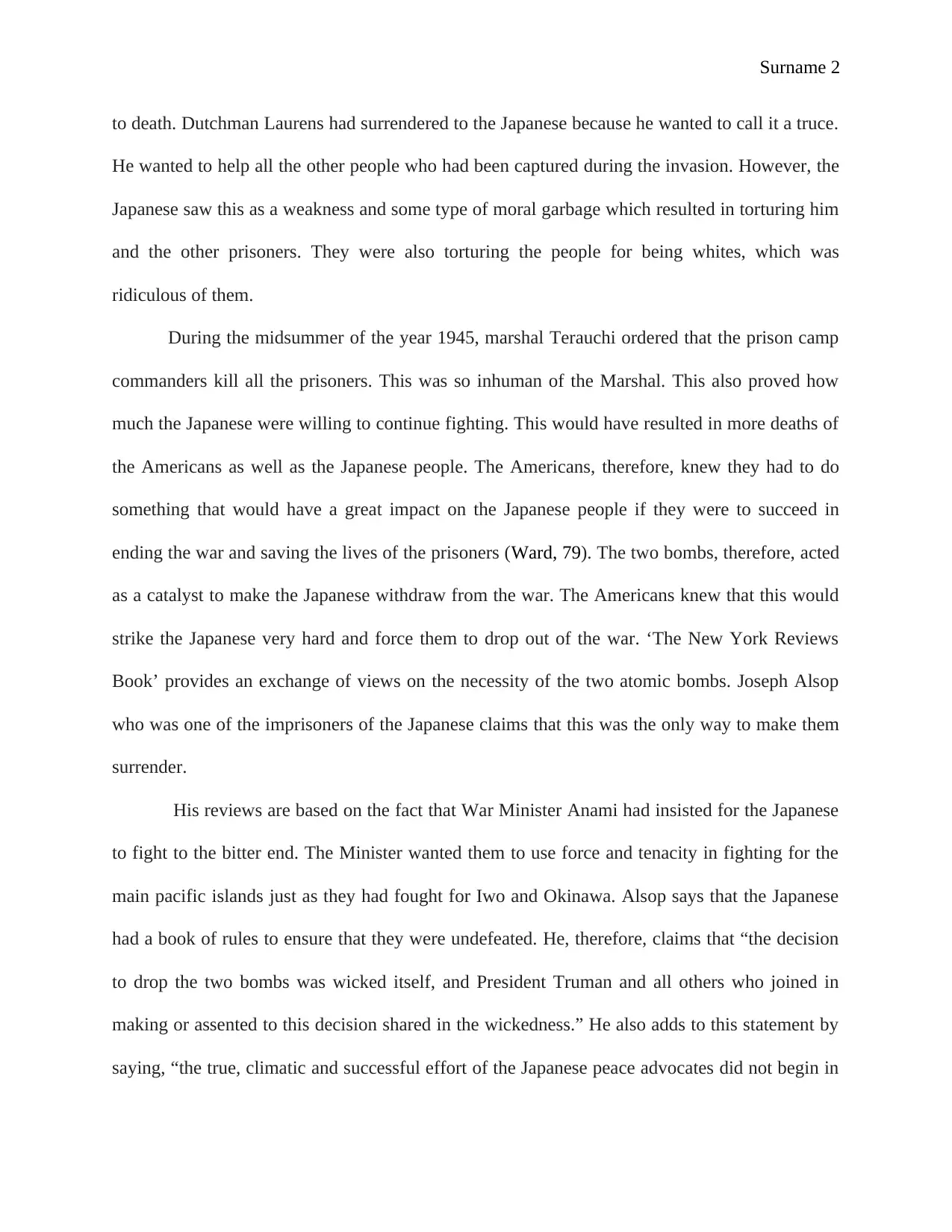
Surname 2
to death. Dutchman Laurens had surrendered to the Japanese because he wanted to call it a truce.
He wanted to help all the other people who had been captured during the invasion. However, the
Japanese saw this as a weakness and some type of moral garbage which resulted in torturing him
and the other prisoners. They were also torturing the people for being whites, which was
ridiculous of them.
During the midsummer of the year 1945, marshal Terauchi ordered that the prison camp
commanders kill all the prisoners. This was so inhuman of the Marshal. This also proved how
much the Japanese were willing to continue fighting. This would have resulted in more deaths of
the Americans as well as the Japanese people. The Americans, therefore, knew they had to do
something that would have a great impact on the Japanese people if they were to succeed in
ending the war and saving the lives of the prisoners (Ward, 79). The two bombs, therefore, acted
as a catalyst to make the Japanese withdraw from the war. The Americans knew that this would
strike the Japanese very hard and force them to drop out of the war. ‘The New York Reviews
Book’ provides an exchange of views on the necessity of the two atomic bombs. Joseph Alsop
who was one of the imprisoners of the Japanese claims that this was the only way to make them
surrender.
His reviews are based on the fact that War Minister Anami had insisted for the Japanese
to fight to the bitter end. The Minister wanted them to use force and tenacity in fighting for the
main pacific islands just as they had fought for Iwo and Okinawa. Alsop says that the Japanese
had a book of rules to ensure that they were undefeated. He, therefore, claims that “the decision
to drop the two bombs was wicked itself, and President Truman and all others who joined in
making or assented to this decision shared in the wickedness.” He also adds to this statement by
saying, “the true, climatic and successful effort of the Japanese peace advocates did not begin in
to death. Dutchman Laurens had surrendered to the Japanese because he wanted to call it a truce.
He wanted to help all the other people who had been captured during the invasion. However, the
Japanese saw this as a weakness and some type of moral garbage which resulted in torturing him
and the other prisoners. They were also torturing the people for being whites, which was
ridiculous of them.
During the midsummer of the year 1945, marshal Terauchi ordered that the prison camp
commanders kill all the prisoners. This was so inhuman of the Marshal. This also proved how
much the Japanese were willing to continue fighting. This would have resulted in more deaths of
the Americans as well as the Japanese people. The Americans, therefore, knew they had to do
something that would have a great impact on the Japanese people if they were to succeed in
ending the war and saving the lives of the prisoners (Ward, 79). The two bombs, therefore, acted
as a catalyst to make the Japanese withdraw from the war. The Americans knew that this would
strike the Japanese very hard and force them to drop out of the war. ‘The New York Reviews
Book’ provides an exchange of views on the necessity of the two atomic bombs. Joseph Alsop
who was one of the imprisoners of the Japanese claims that this was the only way to make them
surrender.
His reviews are based on the fact that War Minister Anami had insisted for the Japanese
to fight to the bitter end. The Minister wanted them to use force and tenacity in fighting for the
main pacific islands just as they had fought for Iwo and Okinawa. Alsop says that the Japanese
had a book of rules to ensure that they were undefeated. He, therefore, claims that “the decision
to drop the two bombs was wicked itself, and President Truman and all others who joined in
making or assented to this decision shared in the wickedness.” He also adds to this statement by
saying, “the true, climatic and successful effort of the Japanese peace advocates did not begin in
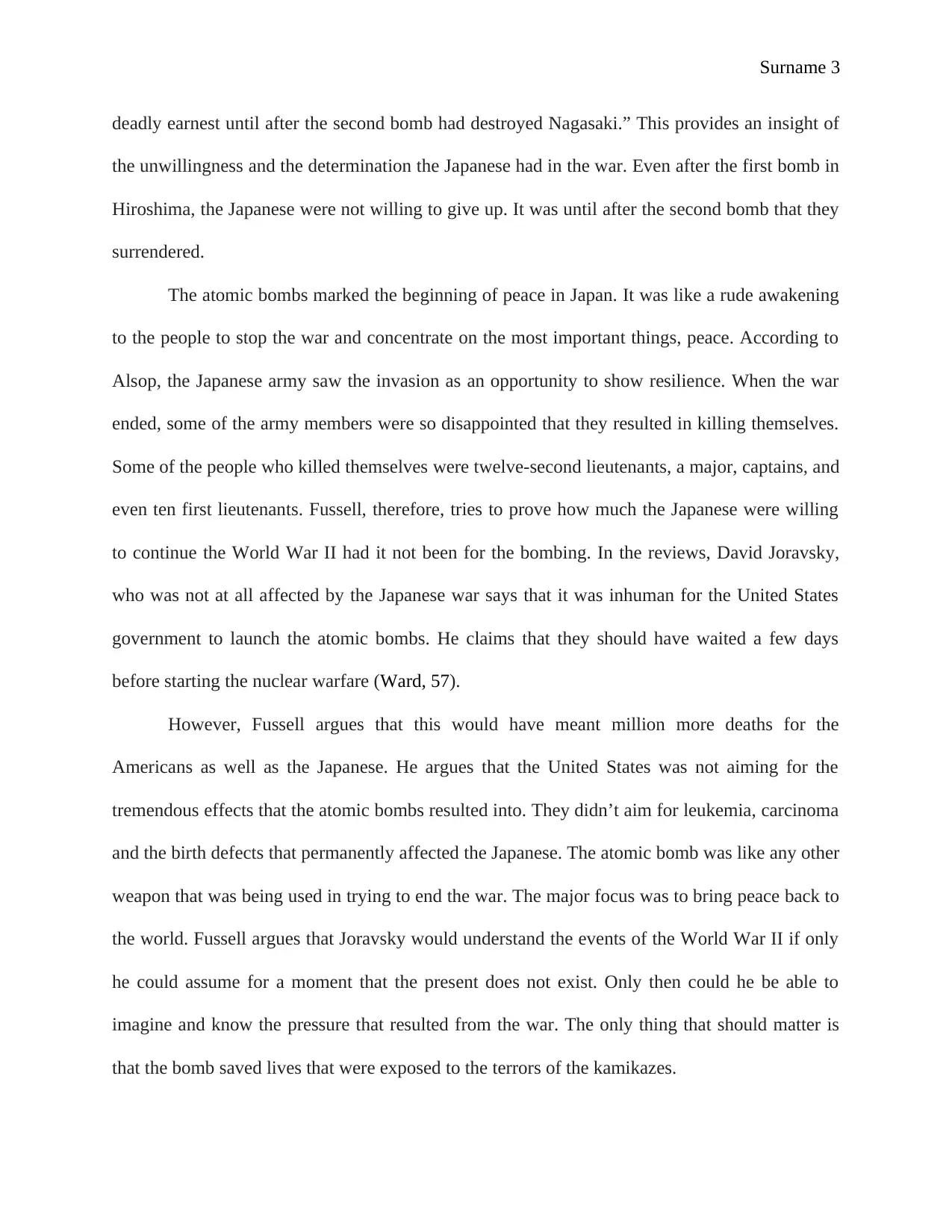
Surname 3
deadly earnest until after the second bomb had destroyed Nagasaki.” This provides an insight of
the unwillingness and the determination the Japanese had in the war. Even after the first bomb in
Hiroshima, the Japanese were not willing to give up. It was until after the second bomb that they
surrendered.
The atomic bombs marked the beginning of peace in Japan. It was like a rude awakening
to the people to stop the war and concentrate on the most important things, peace. According to
Alsop, the Japanese army saw the invasion as an opportunity to show resilience. When the war
ended, some of the army members were so disappointed that they resulted in killing themselves.
Some of the people who killed themselves were twelve-second lieutenants, a major, captains, and
even ten first lieutenants. Fussell, therefore, tries to prove how much the Japanese were willing
to continue the World War II had it not been for the bombing. In the reviews, David Joravsky,
who was not at all affected by the Japanese war says that it was inhuman for the United States
government to launch the atomic bombs. He claims that they should have waited a few days
before starting the nuclear warfare (Ward, 57).
However, Fussell argues that this would have meant million more deaths for the
Americans as well as the Japanese. He argues that the United States was not aiming for the
tremendous effects that the atomic bombs resulted into. They didn’t aim for leukemia, carcinoma
and the birth defects that permanently affected the Japanese. The atomic bomb was like any other
weapon that was being used in trying to end the war. The major focus was to bring peace back to
the world. Fussell argues that Joravsky would understand the events of the World War II if only
he could assume for a moment that the present does not exist. Only then could he be able to
imagine and know the pressure that resulted from the war. The only thing that should matter is
that the bomb saved lives that were exposed to the terrors of the kamikazes.
deadly earnest until after the second bomb had destroyed Nagasaki.” This provides an insight of
the unwillingness and the determination the Japanese had in the war. Even after the first bomb in
Hiroshima, the Japanese were not willing to give up. It was until after the second bomb that they
surrendered.
The atomic bombs marked the beginning of peace in Japan. It was like a rude awakening
to the people to stop the war and concentrate on the most important things, peace. According to
Alsop, the Japanese army saw the invasion as an opportunity to show resilience. When the war
ended, some of the army members were so disappointed that they resulted in killing themselves.
Some of the people who killed themselves were twelve-second lieutenants, a major, captains, and
even ten first lieutenants. Fussell, therefore, tries to prove how much the Japanese were willing
to continue the World War II had it not been for the bombing. In the reviews, David Joravsky,
who was not at all affected by the Japanese war says that it was inhuman for the United States
government to launch the atomic bombs. He claims that they should have waited a few days
before starting the nuclear warfare (Ward, 57).
However, Fussell argues that this would have meant million more deaths for the
Americans as well as the Japanese. He argues that the United States was not aiming for the
tremendous effects that the atomic bombs resulted into. They didn’t aim for leukemia, carcinoma
and the birth defects that permanently affected the Japanese. The atomic bomb was like any other
weapon that was being used in trying to end the war. The major focus was to bring peace back to
the world. Fussell argues that Joravsky would understand the events of the World War II if only
he could assume for a moment that the present does not exist. Only then could he be able to
imagine and know the pressure that resulted from the war. The only thing that should matter is
that the bomb saved lives that were exposed to the terrors of the kamikazes.
⊘ This is a preview!⊘
Do you want full access?
Subscribe today to unlock all pages.

Trusted by 1+ million students worldwide
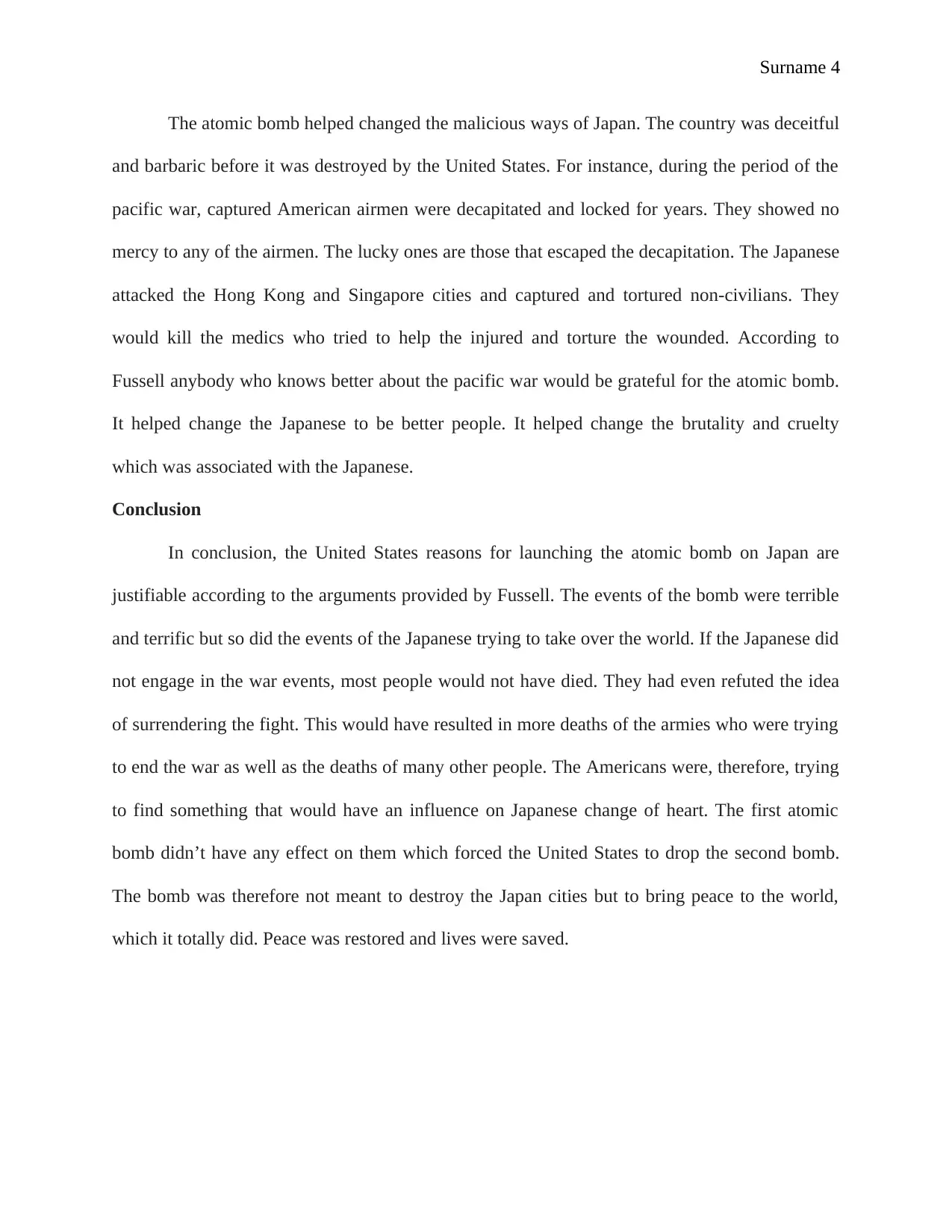
Surname 4
The atomic bomb helped changed the malicious ways of Japan. The country was deceitful
and barbaric before it was destroyed by the United States. For instance, during the period of the
pacific war, captured American airmen were decapitated and locked for years. They showed no
mercy to any of the airmen. The lucky ones are those that escaped the decapitation. The Japanese
attacked the Hong Kong and Singapore cities and captured and tortured non-civilians. They
would kill the medics who tried to help the injured and torture the wounded. According to
Fussell anybody who knows better about the pacific war would be grateful for the atomic bomb.
It helped change the Japanese to be better people. It helped change the brutality and cruelty
which was associated with the Japanese.
Conclusion
In conclusion, the United States reasons for launching the atomic bomb on Japan are
justifiable according to the arguments provided by Fussell. The events of the bomb were terrible
and terrific but so did the events of the Japanese trying to take over the world. If the Japanese did
not engage in the war events, most people would not have died. They had even refuted the idea
of surrendering the fight. This would have resulted in more deaths of the armies who were trying
to end the war as well as the deaths of many other people. The Americans were, therefore, trying
to find something that would have an influence on Japanese change of heart. The first atomic
bomb didn’t have any effect on them which forced the United States to drop the second bomb.
The bomb was therefore not meant to destroy the Japan cities but to bring peace to the world,
which it totally did. Peace was restored and lives were saved.
The atomic bomb helped changed the malicious ways of Japan. The country was deceitful
and barbaric before it was destroyed by the United States. For instance, during the period of the
pacific war, captured American airmen were decapitated and locked for years. They showed no
mercy to any of the airmen. The lucky ones are those that escaped the decapitation. The Japanese
attacked the Hong Kong and Singapore cities and captured and tortured non-civilians. They
would kill the medics who tried to help the injured and torture the wounded. According to
Fussell anybody who knows better about the pacific war would be grateful for the atomic bomb.
It helped change the Japanese to be better people. It helped change the brutality and cruelty
which was associated with the Japanese.
Conclusion
In conclusion, the United States reasons for launching the atomic bomb on Japan are
justifiable according to the arguments provided by Fussell. The events of the bomb were terrible
and terrific but so did the events of the Japanese trying to take over the world. If the Japanese did
not engage in the war events, most people would not have died. They had even refuted the idea
of surrendering the fight. This would have resulted in more deaths of the armies who were trying
to end the war as well as the deaths of many other people. The Americans were, therefore, trying
to find something that would have an influence on Japanese change of heart. The first atomic
bomb didn’t have any effect on them which forced the United States to drop the second bomb.
The bomb was therefore not meant to destroy the Japan cities but to bring peace to the world,
which it totally did. Peace was restored and lives were saved.
Paraphrase This Document
Need a fresh take? Get an instant paraphrase of this document with our AI Paraphraser
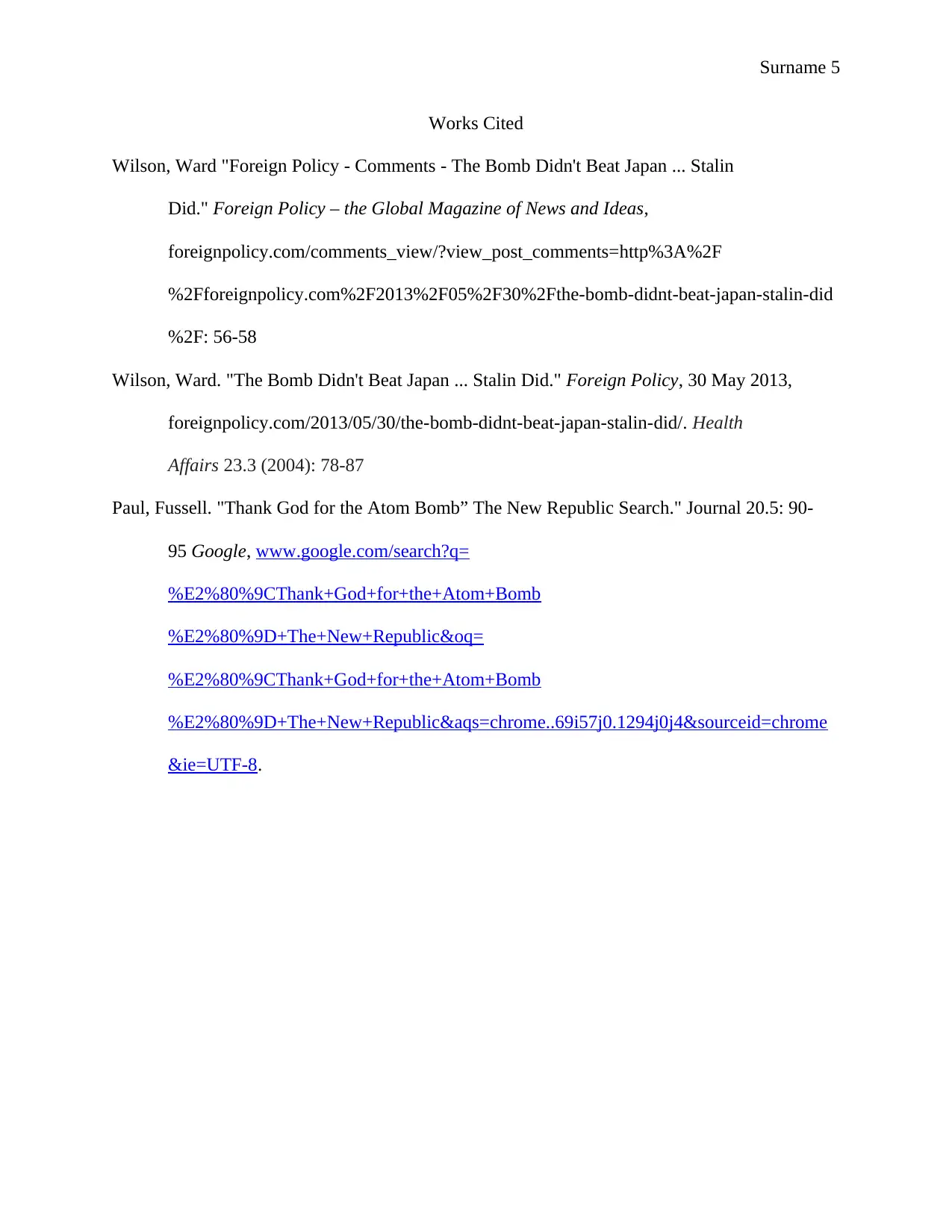
Surname 5
Works Cited
Wilson, Ward "Foreign Policy - Comments - The Bomb Didn't Beat Japan ... Stalin
Did." Foreign Policy – the Global Magazine of News and Ideas,
foreignpolicy.com/comments_view/?view_post_comments=http%3A%2F
%2Fforeignpolicy.com%2F2013%2F05%2F30%2Fthe-bomb-didnt-beat-japan-stalin-did
%2F: 56-58
Wilson, Ward. "The Bomb Didn't Beat Japan ... Stalin Did." Foreign Policy, 30 May 2013,
foreignpolicy.com/2013/05/30/the-bomb-didnt-beat-japan-stalin-did/. Health
Affairs 23.3 (2004): 78-87
Paul, Fussell. "Thank God for the Atom Bomb” The New Republic Search." Journal 20.5: 90-
95 Google, www.google.com/search?q=
%E2%80%9CThank+God+for+the+Atom+Bomb
%E2%80%9D+The+New+Republic&oq=
%E2%80%9CThank+God+for+the+Atom+Bomb
%E2%80%9D+The+New+Republic&aqs=chrome..69i57j0.1294j0j4&sourceid=chrome
&ie=UTF-8.
Works Cited
Wilson, Ward "Foreign Policy - Comments - The Bomb Didn't Beat Japan ... Stalin
Did." Foreign Policy – the Global Magazine of News and Ideas,
foreignpolicy.com/comments_view/?view_post_comments=http%3A%2F
%2Fforeignpolicy.com%2F2013%2F05%2F30%2Fthe-bomb-didnt-beat-japan-stalin-did
%2F: 56-58
Wilson, Ward. "The Bomb Didn't Beat Japan ... Stalin Did." Foreign Policy, 30 May 2013,
foreignpolicy.com/2013/05/30/the-bomb-didnt-beat-japan-stalin-did/. Health
Affairs 23.3 (2004): 78-87
Paul, Fussell. "Thank God for the Atom Bomb” The New Republic Search." Journal 20.5: 90-
95 Google, www.google.com/search?q=
%E2%80%9CThank+God+for+the+Atom+Bomb
%E2%80%9D+The+New+Republic&oq=
%E2%80%9CThank+God+for+the+Atom+Bomb
%E2%80%9D+The+New+Republic&aqs=chrome..69i57j0.1294j0j4&sourceid=chrome
&ie=UTF-8.
1 out of 5
Related Documents
Your All-in-One AI-Powered Toolkit for Academic Success.
+13062052269
info@desklib.com
Available 24*7 on WhatsApp / Email
![[object Object]](/_next/static/media/star-bottom.7253800d.svg)
Unlock your academic potential
Copyright © 2020–2025 A2Z Services. All Rights Reserved. Developed and managed by ZUCOL.





